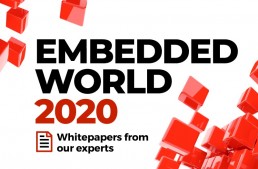One of the things Embedded World is known for are the informative and varied talks given at the event by industry experts. This year at Embedded World, Bernd Niedermeier, our director of Automotive Business Development, and Thom Denholm, our Technical Product Manager, each gave insightful presentations based on whitepapers they had written.
This year, event attendance and spirits within the conference area both remained high. Many students and developers congregated to listen and to learn. Speakers not able to physically attend instead made their presence felt digitally, giving their talks via video call.
We asked some of our professionals how the presentations went.
“My session, presented early Tuesday, was well attended by an audience of around 30,” said Thom Denholm. “This is an interesting topic for us, because more customers every year are using NAND based media, and we want them to get the best value for their investment. Using the right file system (and smart discards) is only one of the suggestions – the others are focused on the design itself.”
“Bernd spoke on the third day,” said Kerri McConnell, our VP of Corporate Development. “His topic was the Challenges of Tomorrow’s Data Storage Integrity in Automotive and IOT Projects. This discussion nicely described the many challenges encountered by Tuxera customers. We believe it is critically important for them to be thorough in their selection of software.”
Didn’t make it to Embedded World 2020? No problem. Below, you can read abstracts to the whitepapers by Bernd and Thom, and you’ll be able to download the whitepapers to read at your leisure.
How to Avoid End of Life from NAND Correctable Errors
While flash media is great for the majority of use cases, heavy reads can cause correctable errors. Linux flash file systems actually shorten the life of the media when dealing with these errors. How does this change with multiple bits per cell, including recent QLC NAND? This paper, written by Thom Denholm, covers both this problem and the impacts in detail, from flash file systems to SSDs and other NAND flash-based media.
Challenges of Tomorrow’s Data Storage Integrity in Automotive and IOT Projects
Historically, automotive control units were quite literally read only. Functionality has been defined by the developer at the very beginning, with no major changes over lifetime. The number of write cycles for flash memory was a no-worry. Now, systems have become much more complex with ECUs consolidated into domain controllers and hosting multiple functions on one SOC. The introduction of Android makes cars look like mobile phones but with a higher lifetime of 10-15 years. Together with OTA updates, this results in many more write cycles that might make the flash wear out before end of life of the car.
Fragmentation is observed to have an impact on performance in mobile devices – and could simply break an automotive system. Issues like FCA’s endless loop update from 2018, or the Spotify bug from 2016 with writing 5 GB per hour to flash, puts further risk on future systems. This paper, written by Bernd Niedermeier, describes those effects more in detail and suggests measures to mitigate the risks.
Final thoughts
Events like Embedded World provide Tuxera’s industry professionals with unique opportunities to meet passionate partners, exchange expertise – and, whenever possible, inspire the next generation of budding industry enthusiasts.
We’re looking forward to Embedded World 2021, and are already planning our next topic submissions based on industry-wide trends and advancements within file systems and embedded design. Please don’t hesitate to reach out to our experts if there are topics you would like to see discussed – if not for Embedded World, then in another conference or even a focused session for your development team.
Let’s talk about solving your embedded data storage challenges


